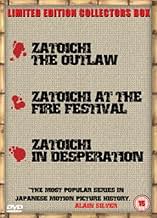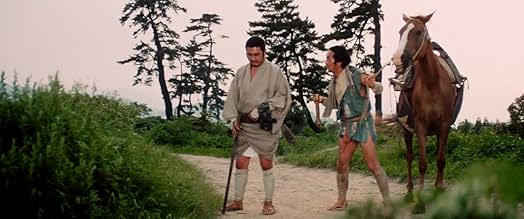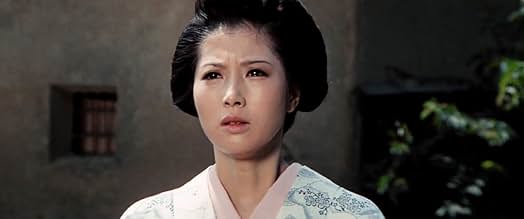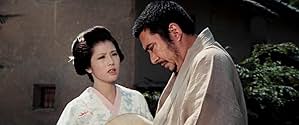AVALIAÇÃO DA IMDb
7,3/10
1,7 mil
SUA AVALIAÇÃO
Adicionar um enredo no seu idiomaZatoichi meets an infamous blind leader of a gangster organization as he contends with a gloomy ronin widower.Zatoichi meets an infamous blind leader of a gangster organization as he contends with a gloomy ronin widower.Zatoichi meets an infamous blind leader of a gangster organization as he contends with a gloomy ronin widower.
- Direção
- Roteiristas
- Elenco e equipe completos
- Produção, bilheteria e muito mais no IMDbPro
Avaliações em destaque
Zatoichi Goes to the Fire Festival is the twenty-first entry in the Japanese franchise about the blind masseur, skilled swordsman and lowly yakuza. This is also by far the most experimental movie in the series so far and comes as an unexpected positive surprise. The vivid story line features several subplots. Let's just focus on the most essential elements. Zatoichi assists a mistress auction where he gives massages to bosses who want to sell or purchase women. Zatoichi seems to be overwhelmed by emotions when the most beautiful woman is sold for a hefty fee and decides to rescue her. However, the woman doesn't react to Zatoichi's gentle behavior and the disappointed swordsman lets her go when he realizes she wants to rob him out and run away. Things turn sour when the woman's husband suspects his wife to have slept with Zatoichi and decides to slay her and follow and ultimately confront her savior throughout the movie. Zatoichi however attends the reunion of some of the bosses who were present at the auction and decides to provoke the arrogant criminals as he despises their self-important swagger. However, he comes across a quite unusual boss named Yamikubo who is blind like Zatoichi but respected by his underlings. The two blind men challenge each other philosophically, intellectually and finally physically. In order to get rid of the troublesome Zatoichi, Yamikubo assigns his assigned successor's daughter to kill the emotional swordsman. In addition to this, an androgynous pimp also wants to kill Zatoichi to become a yakuza. Zatoichi needs to deal with a clever boss, an ambitious drag queen, a seductive protegee and a clever boss in this dynamic film.
Zatoichi Goes to the Fire Festival is my favorite film in the franchise so far for a multitude of reasons. First of all, the story is more adventurous than usual as it deals with unusual topics such as homosexuality and human trafficking. Secondly, the story is quite vivid and comes around with numerous memorable scenes. The bloody fight in the bath might be the most memorable fight scene in any film of the franchise and the final duel sees Zatoichi isolated on an artificial island surrounded by a ring of fire. Thirdly, the film takes some inspiration from Western cinema. The clever boss who challenges a dynamic Zatoichi reminds of Blofeld challenging James Bond in many aspects. The movie includes much more nudity than usually, including many naked yakuza as well as women whose phsyical features are presented in detail at an auction. Even the soundtrack has a vibe inspired by jazz and rock music at certain points but also still features Japanese folkloristic music. Fourthly, the characters in this film are all intriguing. This starts with unimportant side characters such as the bickering and slightly perverted couple who owns a teahouse. It goes on with supporting characters like the silent lady who is saved by Zatoichi or the homosexual pimp who wants to be seen as a real man. It culminates with two very interesting antagonists, the first being the jealous and nihilistic widow and the other one being the clever blind yakuza boss who is as cold as ice. Fifthly, the movie finds a perfectly balanced mixture between comic relief, tense fight sequences, a solid dose of suspense, a shot of tragic romance and some cultural elements thrown in to spice things up.
Obviously, this film is over the top which impresses me but which might irritate those who prefer more traditional chambara films. Homosexuality and nudity are everything but typical components for this type of movie. Some psychedelic flashbacks and experimental cuts also show that this movie was shot in the wild seventies and not in the more traditional sixties. Depending on your taste, this film could be the best but also the worst of the series.
To keep it short, watch this movie if you are craving for a more experimental take on traditional chambara movies after twenty rather streamlined entries in the franchise. Zatoichi Goes to the Fire Festival definitely stands out and is my favorite movie in the franchise up to that point. It deserves more acclaim and attention than it gets and could easily please to a wide audience. It's not the best film to start discovering the franchise because it's so experimental but it's a dynamic fun ride from start to finish you won't forget anytime soon.
Zatoichi Goes to the Fire Festival is my favorite film in the franchise so far for a multitude of reasons. First of all, the story is more adventurous than usual as it deals with unusual topics such as homosexuality and human trafficking. Secondly, the story is quite vivid and comes around with numerous memorable scenes. The bloody fight in the bath might be the most memorable fight scene in any film of the franchise and the final duel sees Zatoichi isolated on an artificial island surrounded by a ring of fire. Thirdly, the film takes some inspiration from Western cinema. The clever boss who challenges a dynamic Zatoichi reminds of Blofeld challenging James Bond in many aspects. The movie includes much more nudity than usually, including many naked yakuza as well as women whose phsyical features are presented in detail at an auction. Even the soundtrack has a vibe inspired by jazz and rock music at certain points but also still features Japanese folkloristic music. Fourthly, the characters in this film are all intriguing. This starts with unimportant side characters such as the bickering and slightly perverted couple who owns a teahouse. It goes on with supporting characters like the silent lady who is saved by Zatoichi or the homosexual pimp who wants to be seen as a real man. It culminates with two very interesting antagonists, the first being the jealous and nihilistic widow and the other one being the clever blind yakuza boss who is as cold as ice. Fifthly, the movie finds a perfectly balanced mixture between comic relief, tense fight sequences, a solid dose of suspense, a shot of tragic romance and some cultural elements thrown in to spice things up.
Obviously, this film is over the top which impresses me but which might irritate those who prefer more traditional chambara films. Homosexuality and nudity are everything but typical components for this type of movie. Some psychedelic flashbacks and experimental cuts also show that this movie was shot in the wild seventies and not in the more traditional sixties. Depending on your taste, this film could be the best but also the worst of the series.
To keep it short, watch this movie if you are craving for a more experimental take on traditional chambara movies after twenty rather streamlined entries in the franchise. Zatoichi Goes to the Fire Festival definitely stands out and is my favorite movie in the franchise up to that point. It deserves more acclaim and attention than it gets and could easily please to a wide audience. It's not the best film to start discovering the franchise because it's so experimental but it's a dynamic fun ride from start to finish you won't forget anytime soon.
'Zatoichi At The Fire Festival' was the 21st entry in the popular martial arts series that starred Shintaro Katsu as the blind swordsman Zatoichi. This time around Zatoichi (who moonlights as a masseur) is present at a geisha auction. Later that night he rescues one of the sold women but she is unexpectedly murdered by a mysterious swordsman. We soon learn that he was the dead woman's husband and that he plans on killing Zatoichi because he believes that his wife slept with him. To complicate things further Zatoichi also makes an enemy of the local boss (a common occurrence in this series!), a blind man known as "the Prince Of Darkness" (played by Masayuki Mori who co-starred in Kurosawa's samurai classic 'Rashomon'), becomes a sort of mentor to a young, effeminate wanna-be pimp Umeji (played by Peter, who later appeared in Kurosawa's 'Ran'), and also falls in love with the beautiful Okiyo (Reiko Ohara). Whew! I'm a relative newcomer to these movies but I'm really loving them. Zatoichi is a fascinating character, shy and funny, but a killing machine when need be. This is one of the best in the series, and the standout scenes are a hilarious attempted seduction of Zatoichi by Umeji, and a killer nude fight sequence in a bathhouse. If Beat Takeshi's recent (excellent) 'Zatoichi' has whetted your appetite try some of the Katsu originals. They are immensely entertaining, and I'll bet twenty bucks that Tarantino is a BIG fan.
I couldn't believe it when I saw Tatsuya Nakadai (Yojimbo, Sanjuro, Harakiri, High and Low, Ran, etc,etc) pop up in this Zatoichi episode as a crazed, jilted husband out for revenge on almost everyone, including Zatoichi. I noticed the credits had a variation of his name (Nakayo, I think it was). We also have Masayuki Mori (Rashomon, The Idiot, etc) as the mandatory evil boss. Only this time, the evil boss is an evil SUPERBOSS, he's blind (and therefore obviously much more dangerous) and resembles Fritz Lang's Dr. Mabuse. We also have a great humorous side story with Peter (the blind younger brother in Ran) playing an effeminate pimp who tries to seduce and kill Zatoichi --a riot--in order to enter the local yakuza gang. There's also a very funny scene with two roadhouse employees that had me laughing out loud. The cast, characters and plot really set this one above many of the Zatoichi's, including the one Katsu did with Toshiro Mifune (Zatoichi vs. Yojimbo). The film is directed by Kenji Misumi, who directed some of the best Zatoichi films as well as several of the Lone Wolf and Cub series. An absolute must-see for Zatoichi fans and highly recommended for sumarai movie fans. As a Zatoichi movie, 11 out of 10, as a samurai movie or on any other basis, 9 of 10.
The following review is an extract from the book "Shintaro Katsu´s Zatoichi: Complete guide to all movies", which is now available on Amazon.
In 1830, in the province of Kanto, a very powerful head of organized crime managed to unify under his command all the clans of the Yakuza. This supreme leader, whom very few have seen, controls with an iron fist illegal businesses such as gambling, prostitution and extortion; and is known throughout Japan as "The Dark Imperial Lord," or "the Shogun of the Underworld".
Zatoichi arrives in that region after witnessing numerous villagers kneeling before an outstanding character transported in palanquin: "Who is that daimyo?" He gets no answer, because it was not a daimyo, but the enigmatic "boss of bosses" and his entourage.
(...)
Together with "Zatoichi 's Pilgrimage" (Kazuo Ikehiro, 1966) this is undoubtedly one of the best episodes in the entire saga of 26 films about Zatoichi (if not directly the best). Made by Kenji Misumi, lead actor Shintaro Katsu participated in the script.
Aesthetic beauty is present throughout the film, and it is worth highlighting a scene in which the mysterious samurai chasing Zatoichi has a kind of flashback nightmare...
In the final scenes, Ichi will have to endure a real hell before confronting the sinister yakuza boss - who is as blind and cunning as he is. But unlike the "Shogun of the Underworld," Ichi is on the side of justice and always denounces hypocrisy and corruption: "We bandits act outside the law, but you behave as if you belonged to royalty..."
In 1830, in the province of Kanto, a very powerful head of organized crime managed to unify under his command all the clans of the Yakuza. This supreme leader, whom very few have seen, controls with an iron fist illegal businesses such as gambling, prostitution and extortion; and is known throughout Japan as "The Dark Imperial Lord," or "the Shogun of the Underworld".
Zatoichi arrives in that region after witnessing numerous villagers kneeling before an outstanding character transported in palanquin: "Who is that daimyo?" He gets no answer, because it was not a daimyo, but the enigmatic "boss of bosses" and his entourage.
(...)
Together with "Zatoichi 's Pilgrimage" (Kazuo Ikehiro, 1966) this is undoubtedly one of the best episodes in the entire saga of 26 films about Zatoichi (if not directly the best). Made by Kenji Misumi, lead actor Shintaro Katsu participated in the script.
Aesthetic beauty is present throughout the film, and it is worth highlighting a scene in which the mysterious samurai chasing Zatoichi has a kind of flashback nightmare...
In the final scenes, Ichi will have to endure a real hell before confronting the sinister yakuza boss - who is as blind and cunning as he is. But unlike the "Shogun of the Underworld," Ichi is on the side of justice and always denounces hypocrisy and corruption: "We bandits act outside the law, but you behave as if you belonged to royalty..."
I bought the Criterion Bluray set,one of my best purchases ever,but mostly so I could get my hands on this movie,possibly the best in the series,and in the top 10 best Chambara flicks ever. Shintaru was in charge on this,and it shows,it has everything Zatoichi fans love,gambling,comedy,some pathos,villainy and great swordsmanship,and boy,does this flick deliver the goods! If you like Samurai cinema,this one is one of the essentials,completely engaging,action entertainment of the finest sort. The director went on to direct the Lone Wolf and Cub series,so you know you are in for a good time,it has some wild imagery,furious jaw dropping swordplay and some nice crimson too! This flick ROCKS!
Você sabia?
- CuriosidadesThis is the twenty-first of 26 films to star Shintaro Katsu as Zatoichi.
- ConexõesFollowed by Shin Zatôichi: Yabure! Tôjin-ken (1971)
Principais escolhas
Faça login para avaliar e ver a lista de recomendações personalizadas
- How long is Zatoichi Goes to the Fire Festival?Fornecido pela Alexa
Detalhes
- Data de lançamento
- País de origem
- Idioma
- Também conhecido como
- Zatoichi Goes to the Fire Festival
- Empresas de produção
- Consulte mais créditos da empresa na IMDbPro
- Tempo de duração1 hora 36 minutos
- Proporção
- 2.35 : 1
Contribua para esta página
Sugerir uma alteração ou adicionar conteúdo ausente

Principal brecha
By what name was O Dia da Violência (1970) officially released in India in English?
Responda




























